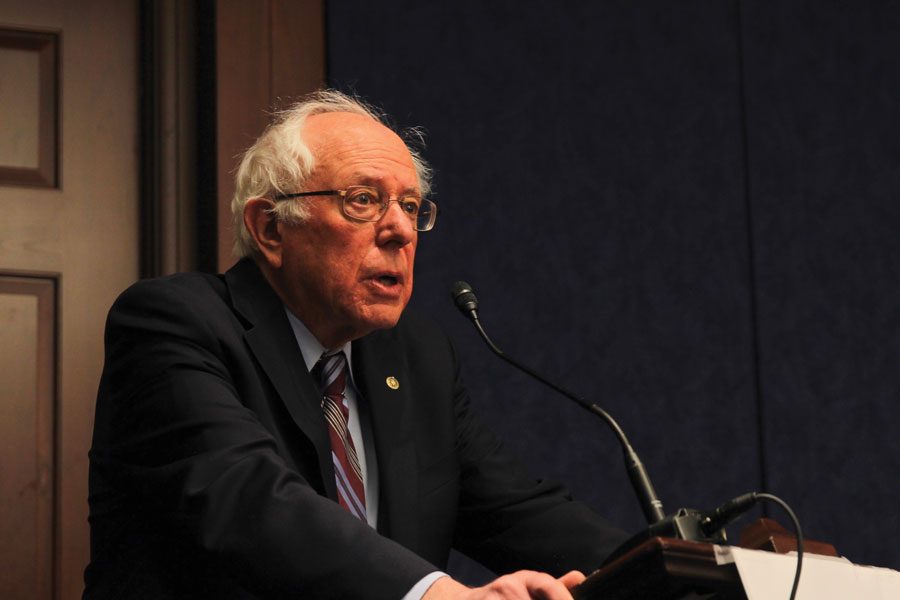Sanders talks economy, race in second campaign stop for 2020 presidential race
Daily file photo by Kristina Karisch
Bernie Sanders speaks in the U.S. Capitol in early 2018.
March 4, 2019
CHICAGO — Sen. Bernie Sanders (I-Vt.) outlined a bold, progressive vision for the country and maintained his focus on economic inequality during the second rally of his 2020 presidential campaign, held Sunday at Navy Pier.
Sanders said he hopes to “complete the political revolution we started three years ago.”
With “Power to the People” blaring over the speakers in Festival Hall, the presidential hopeful took the stage in the city where he spent four years as a student at the University of Chicago. Sanders told a crowd of over 12,000 that his time in Chicago shaped his worldview, especially his understanding of racism, poverty and social challenges.
“My activities here in Chicago taught me a very important lesson that I have never forgotten,” Sanders said. “Real change never takes place from the top on down. It always takes place from the bottom on up.”
Sanders began the rally by talking about the country’s “broken economy,” a familiar talking point from his 2016 campaign. He said three families own more than the bottom half of the country, and 46 percent of all new income goes to the top one percent.
The senator also endorsed Medicare for All. Sanders said he was considered “crazy” for proposing this policy three years ago, but many of the Democrats currently running for president also support it, though each candidate has a different vision for universal health care. He also endorsed a slew of other progressive policies: marijuana legalization, tuition-free public college, a federal jobs guarantee, automatic voter registration and a $15 federal minimum wage.
“Stop paying your workers starvation wages,” Sanders said. “It is not a radical idea to suggest that anyone in America who works 40 hours a week should not be living in poverty.”
At several moments throughout Sanders’ speech, a protestor with a sign that read “NO REPARATIONS NO BLACK VOTE” attempted to interrupt him. Sanders has been criticized by some for not supporting reparations and not addressing the role race plays in the country’s economic issues. But Sanders did not shy away from race in his speech.
While indicating his support for criminal justice reform and an end to cash bail, Sanders noted police violence against “people in the minority community,” naming Chicago’s Laquan McDonald. He said that black men are sentenced to 19 percent more jail time for committing the same crimes, and the war on drugs has disproportionately targeted people of color.
“But not one major Wall Street executive went to jail for destroying our economy in 2008,” said Sanders.
Weinberg first-year Jerry Zhang, who attended the event, said he did not learn anything new about Sanders’ political platform because he was already familiar with the candidate.
While he is not currently supporting Sanders in the Democratic primary, Zhang did not want to miss the opportunity to see a major politician.
“I don’t think I realized how he spoke and how charismatic he was,” Zhang said.
Chicago resident Christopher Valentin said he is supporting Sanders because the senator from Vermont can connect to people of all political backgrounds. Valentin said Sanders popularized many of the political positions Democrats have today.
“None of his politics are for the big corporations,” Valentin said. “They’re for people like you and me.”
Sanders’ volunteers told the crowd beforehand that signs referencing President Donald Trump would not be allowed because “this is not a negative space.”
However, Sanders did not pull punches when talking about the current president.
“We are not only going to defeat Donald Trump, the most dangerous president in modern American history,” Sanders said. “We’re going to transform the United States.”
Email: [email protected]
Twitter: @pamesjollard


